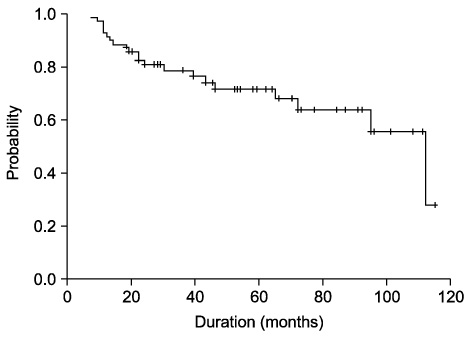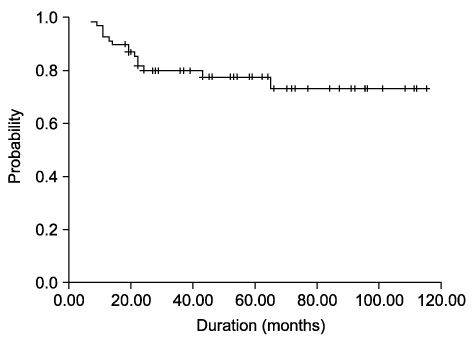Korean J Urol.
2009 Nov;50(11):1073-1077.
Efficacy of Androgen Deprivation Therapy in Patients with Clinically Localized Prostate Cancer
- Affiliations
-
- 1Department of Urology, College of Medicine, Kosin University, Busan, Korea. rhewhy@ns.kosinmed.or.kr
Abstract
- PURPOSE
The purpose of this study was to evaluate the characteristics of patients who received primary androgen deprivation therapy (PADT) for clinically localized prostate cancer and the clinical efficacy of this treatment.
MATERIALS AND METHODS
Between January 1998 and August 2007, patients who underwent PADT for clinically localized prostate adenocarcinoma were analyzed. The patients studied could not receive definitive therapy owing to old age or medical comorbidities. All patients' Gleason score, pretreatment prostate-specific antigen (PSA) value, time to PSA progression, and D'Amico's risk criteria were analyzed.
RESULTS
A total of 72 patients were analyzed. The patients' mean age was 75.29 years (range, 57-92 years) and their median pretreatment PSA was 13.52 ng/ml (range, 1.27-74.82 ng/ml). The median follow-up duration was 39 months (range, 18-115 months). Thirteen patients (18.57%) had PSA progression after reaching a PSA nadir. The mean time to PSA progression was 14 months (range, 7-55 months). Among these 13 patients, 2 patients had low-risk prostate cancer and 11 patients had high-risk prostate cancer by D'Amico's risk criteria. Three of the 13 patients are now receiving chemotherapy, 2 patients died from cancer progression, 3 patients died of a non-cancer cause, and 5 patients are now being conservatively managed. Of the total 72 patients, 70.83% of the patients are still receiving PADT. A total of 11 patients died; however, only 2 deaths were caused by prostate cancer.
CONCLUSIONS
In patients with localized prostate cancer who could not receive definitive therapy for several reasons, the cancer-caused death rate was very low, even in patients with PSA progression. PADT is an effective therapeutic option in patients with localized prostate cancer.
Keyword
MeSH Terms
Figure
Reference
-
1. Huggins C, Hodges C. Studies in prostate cancer: the effect of castration, of estrogen and of androgen injection on serum phosphatases in metastatic carcinoma of prostate. Cancer Res. 1941. 1:293–297.2. Kawakami J, Cowan JE, Elkin EP, Latini DM, DuChane J, Carroll PR. Androgen-deprivation therapy as primary treatment for localized prostate cancer: data from Cancer of the Prostate Strategic Urologic Research Endeavor (CaPSURE). Cancer. 2006. 106:1708–1714.3. D'Amico AV, Whittington R, Malkowicz SB, Schultz D, Blank K, Broderick GA, et al. Biochemical outcome after radical prostatectomy, external beam radiation therapy, or interstitial radiation therapy for clinically localized prostate cancer. JAMA. 1998. 280:969–974.4. Bubley GJ, Carducci M, Dahut W, Dawson N, Daliani D, Eisenberger M, et al. Eligibility and response guidelines for phase II clinical trials in androgen-independent prostate cancer: recommendations from the Prostate-Specific Antigen Working Group. J Clin Oncol. 1999. 17:3461–3467.5. Petrylak DP, Macarthur RB, O'Connor J, Shelton G, Judge T, Balog J, et al. Phase I trial of docetaxel with estramustine in androgen-independent prostate cancer. J Clin Oncol. 1999. 17:958–967.6. Albertsen PC, Hanley JA, Fine J. 20-year outcomes following conservative management of clinically localized prostate cancer. JAMA. 2005. 293:2095–2101.7. Lu-Yao GL, Albertsen PC, Moore DF, Shih W, Lin Y, DiPaola RS, et al. Survival following primary androgen deprivation therapy among men with localized prostate cancer. JAMA. 2008. 300:173–181.8. Labrie F, Candas B, Gomez JL, Cusan L. Can combined androgen blockade provide long-term control or possible cure of localized prostate cancer? Urology. 2002. 60:115–119.9. Janoff DM, Peterson C, Mongoue-Tchokote S, Peters L, Beer TM, Wersinger EM, et al. Clinical outcomes of androgen deprivation as the sole therapy for localized and locally advanced prostate cancer. BJU Int. 2005. 96:503–507.10. Bill-Axelson A, Holmberg L, Ruutu M, Häggman M, Andersson SO, Bratell S, et al. Radical prostatectomy versus watchful waiting in early prostate cancer. N Engl J Med. 2005. 352:1977–1984.11. Akaza H, Homma Y, Usami M, Hirao Y, Tsushima T, Okada K, et al. Efficacy of primary hormone therapy for localized or locally advanced prostate cancer: results of a 10-year follow-up. BJU Int. 2006. 98:573–579.12. Chin OH, Kim SI, Hong SJ. Early experience of localized prostate cancer treated with neoadjuvant androgen ablation therapy and radiotherapy. Korean J Urol. 2001. 42:702–706.
- Full Text Links
- Actions
-
Cited
- CITED
-
- Close
- Share
- Similar articles
-
- Chemotherapy With Androgen Deprivation for Hormone-Naïve Prostate Cancer
- Current Concepts in Androgen Deprivation Therapy
- Intermittent Androgen Deprivation with Goserelin and Flutamide for Prostate Cancer: a Pilot Study
- How Does Androgen Deprivation Therapy Affect Mental Health including Cognitive Dysfunction in Patients with Prostate Cancer?
- Early Experience of Localized Prostate Cancer Treated with Neoadjuvant Androgen Ablation Therapy and Radiotherapy



